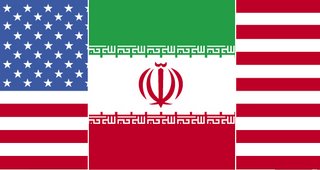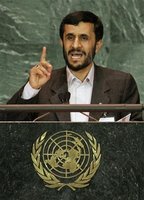Monday, May 29, 2006
Know Thy Enemy: US Considering Talks with Iran

The United States, including Condoleezza Rice, is considering resuming talks with Iran after over 25 years of silence between the two nations. The goal would be to enter into meaningful dialogue over the Iranian nuclear program, and the possibility that the Muslim nation is developing nuclear weapons. However, top members of the administration, including the President and VP, are resisting the temptation to negotiate.
 Since Iran seized American hostages in 1979, the United States has refused dialogue with the country, save some indirect talks at times of extreme crisis. But European leaders, including Germany’s Foreign Minister Frank-Walter Steinmeier, EU Foreign Policy Chief Javier Solana, and German chancellor Agela Merkel, are pushing for the US to join talks and hopefully avert a military conflict over Tehran’s nuclear enrichment program.
Since Iran seized American hostages in 1979, the United States has refused dialogue with the country, save some indirect talks at times of extreme crisis. But European leaders, including Germany’s Foreign Minister Frank-Walter Steinmeier, EU Foreign Policy Chief Javier Solana, and German chancellor Agela Merkel, are pushing for the US to join talks and hopefully avert a military conflict over Tehran’s nuclear enrichment program.
The US is concerned that Iran will rebuff any efforts at negotiations, which would hurt the administration politically, although it is unclear if the ramifications would be felt internationally or only on the home political front. The administration is also concerned that negotiations would anger various groups in Iraq, especially the Sunni’s responsible for much of the chaos in Iraq today.
On the flip side, other people in-the-know are coming out in favor of talks. Former Secretary of State Henry Kissinger indicated in a Washington Post column that the recent letter from Mahmoud Ahmadinejad to President Bush could and should be used as an opening to negotiations with Iran. And Richard Armitage, former deputy Secretary of State under Colin Powell, also came out in favor of talks.
"Diplomacy is much more than just talking to your friends," Mr. Armitage said in a telephone interview. "You've got to talk to people who aren't our friends, and even people you dislike. Some people in the administration think that diplomacy is a sign of weakness. In fact, it can show that you're strong."
 Personally, I’m in favor of negotiations. I do believe there’s a real chance of being rebuffed by Iran, and an even greater possibility that negotiations will have no effect. But Iran very well may be our primary adversary for many years to come, and as such a channel of dialogue presents some real value for our administration.
Personally, I’m in favor of negotiations. I do believe there’s a real chance of being rebuffed by Iran, and an even greater possibility that negotiations will have no effect. But Iran very well may be our primary adversary for many years to come, and as such a channel of dialogue presents some real value for our administration.
First, as Sun Tzu says, know thy enemy. Right now, I believe the Bush administration maintains a certain ignorance about Iran, Ahmadinejad, and radical fundamentalism that can be very dangerous. Any efforts to know the motivations and maneuvers of Iran could have serious long-term benefits.
Second, both while working for the Israeli government and while in small business, I followed a very simple ritual for every meeting I attended: I created two lists, one list of things I wanted to learn from the meeting, one list of things I wanted to learn from the people at the meeting.
You see, there is a great deal to learn from a meeting that has nothing to do with the answers of the participants. Even if a meeting doesn’t take place, if the invitation isn’t accepted, if connections are missed, there are still things to learn, if you’re open to learning them.
Relations between countries in the Middle East, and certain states of warfare, are very complex, and it’s time the US begins to know its enemy. Attempting to engage Iran in negotiations over their nuclear program is as good an excuse as any to begin this process.
technorati tags: Iran, US, Condoleezza Rice, Muslim, Bush, Bush Administration, Frank-Walter Steinmeier, Javier Solana, Angela Merkel, Nuclear, Hebry Kissinger, Mahmoud Ahmadinejad, Richard Armitage, Colin Powell, Sun Tzu
Posted by Scottage at 2:33 AM /
| |




 Since Iran seized American hostages in 1979, the United States has refused dialogue with the country, save some indirect talks at times of extreme crisis. But European leaders, including Germany’s Foreign Minister Frank-Walter Steinmeier, EU Foreign Policy Chief Javier Solana, and German chancellor Agela Merkel, are pushing for the US to join talks and hopefully avert a military conflict over Tehran’s nuclear enrichment program.
Since Iran seized American hostages in 1979, the United States has refused dialogue with the country, save some indirect talks at times of extreme crisis. But European leaders, including Germany’s Foreign Minister Frank-Walter Steinmeier, EU Foreign Policy Chief Javier Solana, and German chancellor Agela Merkel, are pushing for the US to join talks and hopefully avert a military conflict over Tehran’s nuclear enrichment program. Personally, I’m in favor of negotiations. I do believe there’s a real chance of being rebuffed by Iran, and an even greater possibility that negotiations will have no effect. But Iran very well may be our primary adversary for many years to come, and as such a channel of dialogue presents some real value for our administration.
Personally, I’m in favor of negotiations. I do believe there’s a real chance of being rebuffed by Iran, and an even greater possibility that negotiations will have no effect. But Iran very well may be our primary adversary for many years to come, and as such a channel of dialogue presents some real value for our administration.